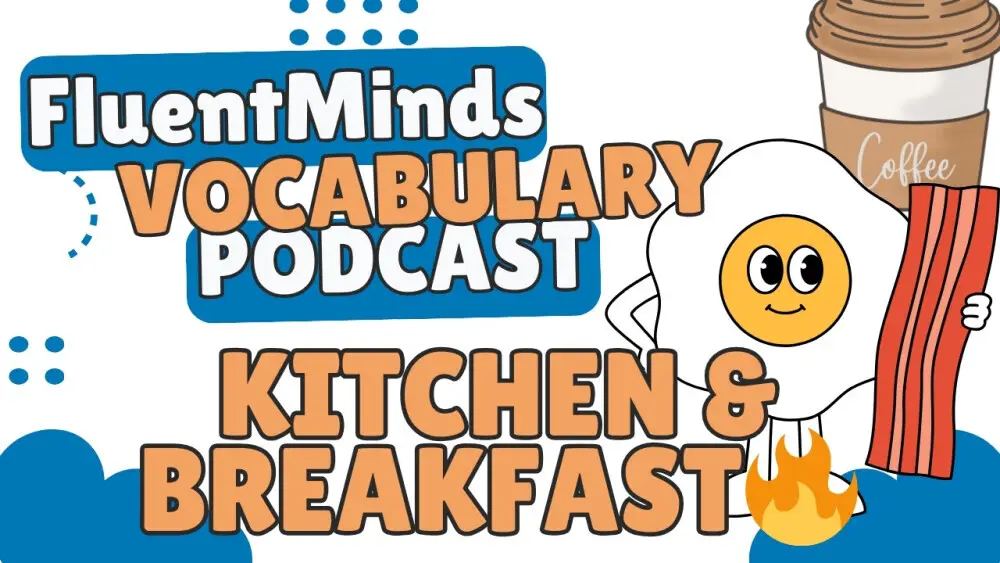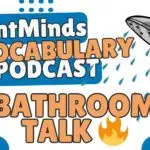KITCHEN & BREAKFAST ENGLISH Kitchen & Breakfast Vocabulary Worksheet
FluentMinds Podcast – Episode 1C
(Based on the video script: “trudge to kitchen,” “fumble for switch,” “slap coffee maker,” etc.)
📝 Download Vocab Worksheet: Kitchen & Breakfast Vocabulary Worksheet
👉 https://inglesxlatinos.com/kitchen-breakfast-vocab
Kitchen & Breakfast Vocabulary Worksheet
A. Kitchen Actions (From the Video)
Basic Verb → Upgraded (Native Version) → Slang/Fun Alternative
- Walk to kitchen → Trudge to kitchen → Zombie-walk to kitchen
- Turn on light → Fumble for the switch → Blindly slap the wall
- Make coffee → Brew coffee → Slap the coffee maker awake
- Pour milk → Glug milk → Dump a splash of moo juice
- Cook eggs → Scramble eggs → Murder the eggs
- Wash dishes → Toss dishes in sink → Let dishes marinate
B. Breakfast Foods (Expanded)
Normal Term → Native Phrases → Humorous Slang
- Toast → Golden-brown toast → Charred bread
- Coffee → Cup of joe → Brain fuel
- Orange juice → Fresh OJ → Liquid sunshine
- Cereal → Breakfast crunch → Sad confetti
C. Problem Phrases (From Sam’s Bloopers)
- “The coffee maker’s possessed!” (When it won’t work)
- “I blackened my omelet… again.” (Burned it)
- “The milk’s gone rogue!” (Expired/spoiled)
2. DIALOGUE TRANSCRIPT HIGHLIGHTS
Key Lines from the Video:
Alex: “After the bathroom, what’s next?”
Sam: “I trudge to the kitchen like a zombie, fumble for the light switch, and slap the coffee maker until it obeys.”
Alex: “How’s breakfast going?”
Sam: “I ‘scrambled’ eggs into charcoal and ‘glugged’ milk straight from the carton. Chef’s kiss!”
3. INTERACTIVE EXERCISES
Exercise 1: Verb Upgrade Challenge
Rewrite these basic sentences using video vocabulary:
- “I walked sleepily to the kitchen.” → _________________________
(Example: “I zombie-walked to the kitchen.”) - “I poured milk too fast.” → _________________________
- “I burned the toast again.” → _________________________
Exercise 2: Register Switch
Convert Sam’s slangy line to formal English:
“I let the dishes marinate in the sink all day.” → _________________________
Exercise 3: Story Time
Describe your most chaotic morning using:
- 3 slang terms (zombie-walk, charred bread, rogue milk)
- 2 formal phrases (prepare breakfast, wash dishes)
- 1 idiom (“Chef’s kiss”)
Exercise 4: Mistake Clinic
Fix these errors using phrases from the video:
❌ “I open eggs in the pan.” → ✅ _________________________
❌ “I walk fast to kitchen.” → ✅ _________________________
4. ANSWER KEY
- “I trudged to the kitchen.” / “I glugged milk.” / “I incinerated the toast.”
- “I left the dishes in the sink all day.”
- Example: “I zombie-walked to the kitchen, ‘prepared breakfast’ (aka murdered eggs), and discovered ‘rogue milk.’ Chef’s kiss!”
- “I crack eggs into the pan.” / “I sprint to the kitchen.”
🍳 Daily Life English Vocabulary (Real Kitchen & Breakfast Phrases!) 🔥
Struggling to describe making coffee or cooking breakfast naturally? This episode teaches 50+ real phrases and slang you need — from “brew a cup of joe” to “scramble eggs into charcoal” and “toss dishes in the sink.” Perfect for A1-C2 learners who want to sound native, not robotic!
🎧 About FluentMinds Podcast:
Fun, dialogue-driven English lessons for learners who hate textbooks. Hosted by Alex (teacher) and Sam (disaster chef), we unpack real native phrases, embarrassing mistakes, and slang you’ll actually use!
#learnenglish #englishvocabulary #englishpodcast #fluentenglish #esl #englishspeaking #englishlesson #languagelearning #kitchenvocabulary #breakfastenglish #englishslang #dailyenglish #fluentmindspodcast #howto
📝 Download Vocab Worksheet: Kitchen & Breakfast Vocabulary Worksheet
CHECK THE PINNED COMMENT!
Includes:
✅ 50+ phrases (with slang vs. formal labels)
✅ Full dialogue transcript for shadowing practice
✅ 3 Bonus Exercises (see below!)
✏️ 3 LONG EXERCISES TO PRACTICE:
- Cooking Commentary Challenge
Record yourself narrating your breakfast routine using 10+ phrases from the video (e.g., “I fumbled for the coffee filters”, “I incinerated the toast”). - Register Swap
Rewrite Sam’s kitchen disaster using: -
- Formal phrases (“I prepared breakfast”)
- Slang (“I yeeted the burnt toast”)
- Dialogue Practice
Create a conversation where someone runs out of coffee or burns their eggs. Use phrases like: -
- “The coffee maker’s possessed!”
- “I blackened my omelet… again.”
💬 COMMENT:
What’s your breakfast disaster story?
“I once ______ and had to eat cereal for dinner!”
🔗 Catch Up:
- E1A: Morning Routines
- E1B: Bathroom Vocabulary
5. WHY THIS VOCABULARY MATTERS: CULTURE & CONNECTION
A. Why Native Speakers Sound “Natural”
The phrases in this cheat sheet (like “trudge to the kitchen” or “let dishes marinate”) reveal a hidden rule of fluent English: Native speakers prioritize imagery over precision.
- Example: Saying “I zombie-walked to the kitchen” isn’t just funny—it paints a vivid picture of exhaustion. Textbook phrases like “I walked sleepily” lack the same punch.
- Pro Tip: Notice how verbs like “glug” (pour noisily) or “slap” (hit clumsily) activate the senses. This is why slang often wins over “correct” terms in casual speech.
B. Breakfast Culture Clashes
What you eat (and how you describe it) can be a cultural minefield!
- Coffee Chaos: In the U.S., “brew coffee” is standard, but Brits might “put the kettle on” for tea. Meanwhile, Australians call their coffee “a flat white”—a term that baffles Americans!
- Eggs-ecutive Decisions: “Scrambled eggs” sounds simple, but in the UK, “whisked eggs” is more common. Burn them? Americans say “charred”, Brits say “buggered”, and Australians laugh with “buggered” (yes, really).
Fun Fact: The phrase “cup of joe” (coffee) comes from 1930s U.S. Navy slang—named after a ban on alcohol, making coffee the strongest drink aboard!
C. How to Practice Without Sounding Forced
Slang goes wrong fast if overused. Here’s how to balance humor and clarity:
- Start Small: Swap one basic word per sentence.
-
- “I poured milk” → “I glugged milk” (more natural, but not exaggerated).
- Match the Tone: Use “rogue milk” with friends but “expired milk” with your boss.
- Listen for Context: Notice when natives say “brew coffee” (formal) vs. “slap the coffee maker”(humorous/exaggerated).
D. Real-Life Kitchen Disasters (And How to Describe Them)
Ever had a breakfast fail? Here’s how to narrate it like a native:
- The Soggy Cereal Tragedy:
“I zombie-walked to the kitchen, drowned my cereal in rogue milk, and ended up eating sad confetti soup.” - The Burnt Toast Incident:
“I murdered the bread into charcoal, then yeeted it into the bin. Chef’s kiss!”
Why This Works: Each phrase (zombie-walked, rogue milk, sad confetti) replaces generic words with memorable imagery—exactly how natives joke about mishaps.
E. Your Homework: The “Kitchen Commentary” Challenge
To cement these phrases, try this:
- Record a Voice Memo: Narrate your next breakfast using 5+ terms from the list.
-
- “I fumbled for the coffee filters… the machine’s possessed… glory be, it works!”
- React Like a YouTuber: Over-describe a simple task (“Behold! I glug the moo juice!”).
- Comment Below: Share your funniest kitchen fail using slang from the sheet!


